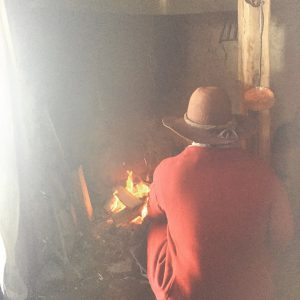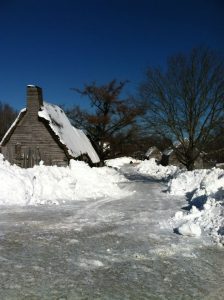One thing that we can all agree on is that New England weather always keeps us guessing! In a matter of days, the Boston area saw a “bomb-cyclone” drop over a foot of snow, lower than normal temperatures for consecutive days, as well as a stretch of 60-degree weather. As we celebrate a new year, I’m beginning to wonder about the weather conditions when the Mayflower passengers landed. What did they encounter? What did they expect?
We know that the passengers were not prepared for the New England weather, as many perished during the first winter (nearly half died). I am brought to Edward Winslow’s Good Newes from New England,[1] where in 1623 he states:
for the temperature of the air, in almost three years’ experience I can scarce distinguish New England from Old England, in respect to heat and cold, frost, snow rain, winds, &c. Some object, because our Plantation lieth in the latitude of 42 degrees, it must needs be much hotter. I confess I cannot give the reason of the contrary; only experience teacheth us, that if it do not exceed England, it is so little must require better judgements to discern it.
 And for winter, I rather think (if there be difference) it is both sharper and longer in New England than Old; and yet the want of those comforts in the one, which I have enjoyed in the other, may deceive my judgement also. But in my best observation, comparing our own condition with the Relations of other parts of America, I cannot conceive of any to agree better with the constitution of the England, not being oppressed with extremity of heat, nor nipped by biting cold; by which means, blessed be God, we enjoy our health, notwithstanding those difficulties we have undergone, in such a measure as would have been admired if we had lived in England with the like means. The day is two hours longer than here, when it is at the shortest, and as much shorter there, when it is at the longest.”
And for winter, I rather think (if there be difference) it is both sharper and longer in New England than Old; and yet the want of those comforts in the one, which I have enjoyed in the other, may deceive my judgement also. But in my best observation, comparing our own condition with the Relations of other parts of America, I cannot conceive of any to agree better with the constitution of the England, not being oppressed with extremity of heat, nor nipped by biting cold; by which means, blessed be God, we enjoy our health, notwithstanding those difficulties we have undergone, in such a measure as would have been admired if we had lived in England with the like means. The day is two hours longer than here, when it is at the shortest, and as much shorter there, when it is at the longest.”
As we gain more minutes of daylight in Boston and we approach the four-hundredth anniversary of the Mayflower landing in Plymouth, I wonder: Why were the passengers not prepared for the winter cold? The comparison that Winslow makes of Old England and New England may refer to the assumption that the weather would be similar at the same latitudinal level and thus, when arriving in November/December, did they expect Old England winter weather and not the harsh winter that we are all familiar with now?
As for myself, I don’t know where I would be without floor-length parkas, mittens, and wool hats this winter.
Note
[1] Edward Winslow, Good Newes from New England, https://archive.org/details/goodnewesfromnew00wins.
Share this:

About Sarah Dery
Sarah Dery has been with American Ancestors since 2017, working closely with the Chief of Research. In her role, Sarah manages the Research & Library Services team, overseeing the day-to-day operations, supporting the researchers and genealogists, and coordinating correspondence with clients. She is always eager to lend a helping hand wherever needed, playing a key role in applying her extensive genealogical knowledge to assist both in-person and virtually. Her expertise and willingness to support others make her an invaluable asset to the American Ancestors team. A graduate of Rhode Island College in Providence, Sarah holds a B.A. in Anthropology and English Literature. Her passion for Anthropology was sparked during her participation in a week-long archaeology dig at James Madison’s Montpelier in Virginia. Sarah’s genealogical expertise is particularly focused on families with roots in Rhode Island, Connecticut, and French-Canada. After a year-long research project focused on Associate Justice Ketanji Brown Jackson's ancestry, Sarah has developed expertise in researching enslaved individuals, particularly in the Southern states. She now contributes her skills to the 10 Million Names project, working toward the goal of recovering the names of the estimated 10 million men, women, and children of African descent who were enslaved in pre- and post-colonial America (specifically, the territory that would become the United States) between the 1500s and 1865.View all posts by Sarah Dery →
